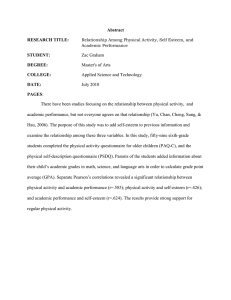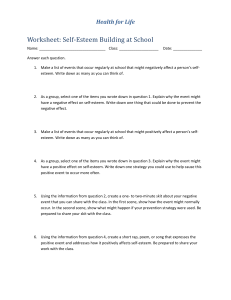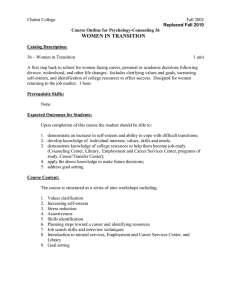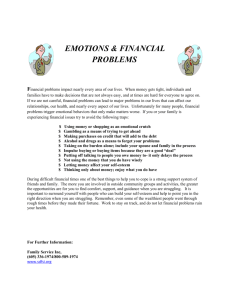Helping to Build a Healthy Self-Esteem
advertisement
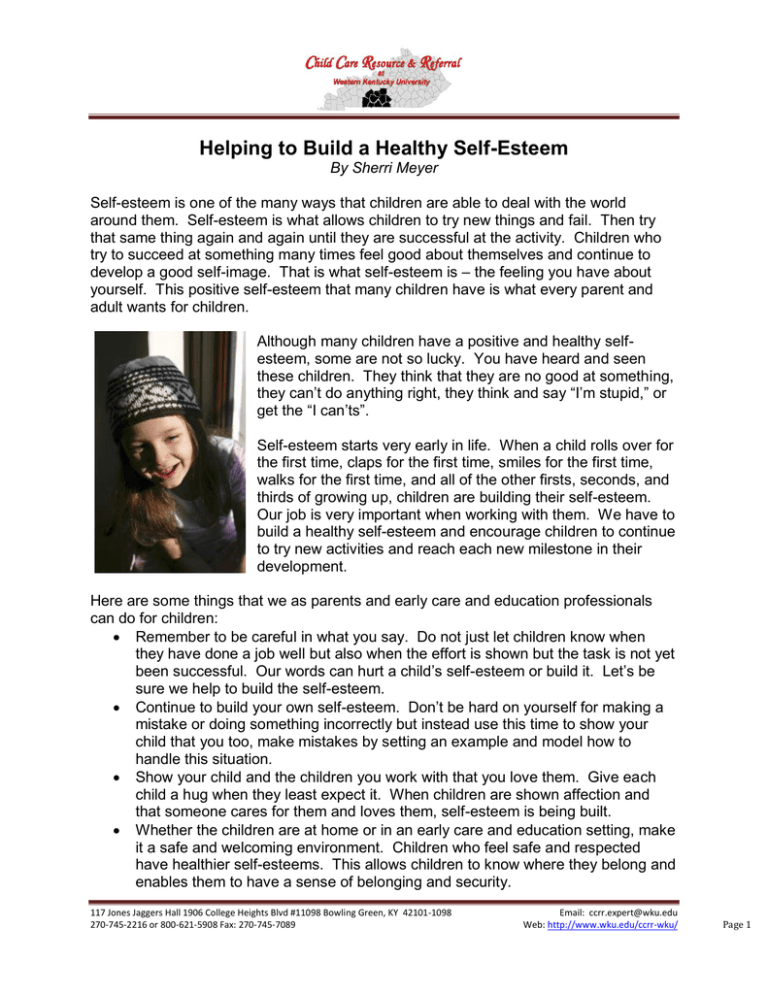
Helping to Build a Healthy Self-Esteem By Sherri Meyer Self-esteem is one of the many ways that children are able to deal with the world around them. Self-esteem is what allows children to try new things and fail. Then try that same thing again and again until they are successful at the activity. Children who try to succeed at something many times feel good about themselves and continue to develop a good self-image. That is what self-esteem is – the feeling you have about yourself. This positive self-esteem that many children have is what every parent and adult wants for children. Although many children have a positive and healthy selfesteem, some are not so lucky. You have heard and seen these children. They think that they are no good at something, they can’t do anything right, they think and say “I’m stupid,” or get the “I can’ts”. Self-esteem starts very early in life. When a child rolls over for the first time, claps for the first time, smiles for the first time, walks for the first time, and all of the other firsts, seconds, and thirds of growing up, children are building their self-esteem. Our job is very important when working with them. We have to build a healthy self-esteem and encourage children to continue to try new activities and reach each new milestone in their development. Here are some things that we as parents and early care and education professionals can do for children: Remember to be careful in what you say. Do not just let children know when they have done a job well but also when the effort is shown but the task is not yet been successful. Our words can hurt a child’s self-esteem or build it. Let’s be sure we help to build the self-esteem. Continue to build your own self-esteem. Don’t be hard on yourself for making a mistake or doing something incorrectly but instead use this time to show your child that you too, make mistakes by setting an example and model how to handle this situation. Show your child and the children you work with that you love them. Give each child a hug when they least expect it. When children are shown affection and that someone cares for them and loves them, self-esteem is being built. Whether the children are at home or in an early care and education setting, make it a safe and welcoming environment. Children who feel safe and respected have healthier self-esteems. This allows children to know where they belong and enables them to have a sense of belonging and security. 117 Jones Jaggers Hall 1906 College Heights Blvd #11098 Bowling Green, KY 42101-1098 270-745-2216 or 800-621-5908 Fax: 270-745-7089 Email: ccrr.expert@wku.edu Web: http://www.wku.edu/ccrr-wku/ Page 1 Children need to have choices throughout their day. Allow children to make appropriate choices. For example, provide two acceptable outfits to wear for the day and allow the child to decide which to choose. Provide toys and materials on the child’s level and allow the child to choose what to play with and with whom to play. This sounds easy but often adults forget to allow children to choose and make choices. Encourage cooperation (or working as a team) instead of competition to help build a healthy self-esteem. Allow children to help others, both adults and other children. Every person feels better about themselves when we help others in need. Read to someone, hold the door open for a stranger, or just say hello. Building a healthy selfesteem is vital to children growing up and being constructive and productive adults in our communities. Children are so very important. Take a few minutes and evaluate your time and efforts with children and make every word spoken or action taken be one of care and compassion to help every child become a healthy adult. It begins with us and lasts a lifetime! For more information on building a healthy self-esteem in children, call the CCR&R library to check out resources on this topic. There are also some websites you may want to visit for additional ideas. http://kidshealth.org where there is information for parents, kids, and teens; http://www.aap.org where you will find many topics in addition to self-esteem; and http://www.self-esteem-nase.org where there is much information for parents as well as articles and books. Copyright © 2009 WKU Child Care Resource and Referral Funded in part by the Kentucky Cabinet for Health and Family Services through the University of Kentucky Research Foundation. Equal Education and Employment Opportunities. 117 Jones Jaggers Hall 1906 College Heights Blvd #11098 Bowling Green, KY 42101-1098 270-745-2216 or 800-621-5908 Fax: 270-745-7089 Email: ccrr.expert@wku.edu Web: http://www.wku.edu/ccrr-wku/ Page 2
